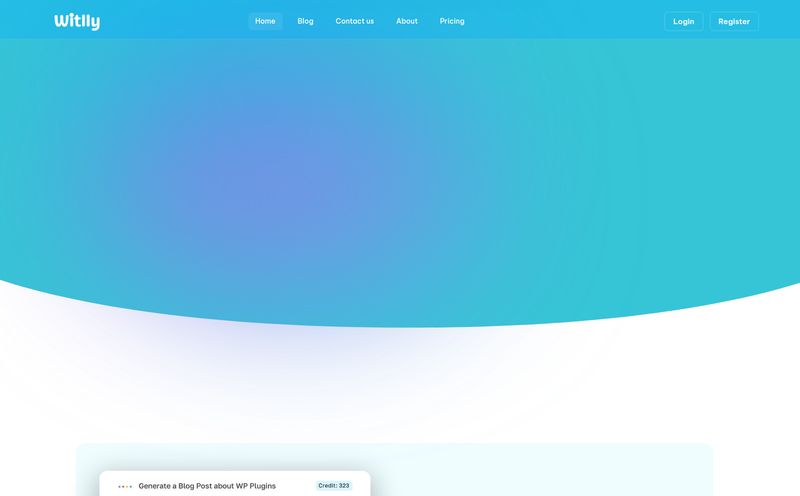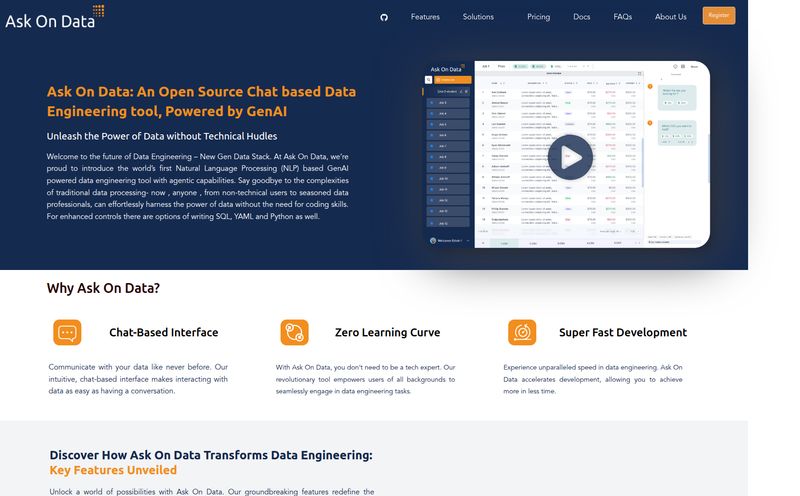We’ve all tried journaling at some point. You buy a nice Moleskine notebook, a pen that feels just right, and you promise yourself, “This is it. This is the year I become a disciplined, introspective journaling person.” And for three days, you’re great. You write about your day, your hopes your frustrations. Then day four is busy. Day five you forget. By week two, that beautiful notebook is just another coaster for your coffee mug.
I’ve been there. My bookshelf is a graveyard of half-finished journals. The problem for me was always the feedback loop. Or, the lack of one. You pour your heart out onto a page, and it just... sits there. It doesn’t talk back. It doesn’t offer a new perspective.
So when I stumbled across AI Journaler on Product Hunt, my curiosity was definitely piqued. An AI that reads my ramblings and helps me understand myself? A journaling app that promises to supercharge emotional resilience? Okay, color me intrigued. But as someone who's seen a million 'AI-powered' tools that are just fancy marketing for a simple algorithm, I was also a healthy dose of skeptical. Is this thing for real, or just another gimmick? I had to find out.
So, What Exactly Is This AI Journaler Thing?
At its core, AI Journaler is a straightforward journaling application for Windows PCs. It looks clean, simple, and gives you a blank space to write. No fuss. But the magic, or at least the advertised magic, happens after you hit 'save'. The app uses artificial intelligence to analyze what you've written. It doesn’t just store your words; it tries to understand them.
Think of it as a cross between a diary, a data analyst, and a very, very patient friend who is good at asking questions. It’s designed to spot patterns in your thinking, identify emotional challenges, and give you insights that you might miss on your own. And the best part? It's currently free. Which, in the world of expensive apps and endless subscriptions, is a word that always gets my attention.
Getting Started: My First Five Minutes with the App
The website promises a simple 5-step process, and honestly, they delivered. You hit 'Download Now,' run the installer, and boom—it's on your Windows PC. No complicated sign-up forms, no credit card required, no twenty-page user agreement to scroll through. It was refreshing.
I opened it up and was greeted by a clean, minimalist interface. Just a blank page, waiting for my thoughts. So, I decided to give it a test run with a generic, slightly stressful entry about a project deadline and a client who kept changing their mind. The kind of day that leaves your brain feeling like a tangled ball of yarn.
I wrote a few paragraphs, trying to be as honest as I would in a private journal. I closed the entry, took a breath, and went to see what the AI had to say about my little mental meltdown.

Visit AI Journaler
The Core Features That Actually Matter
An app can have a million features, but only a few usually make or break the experience. For AI Journaler, it really comes down to a couple of innovative ideas.
The AI Analysis: Your Personal Thought Detective
This is the main event. After I wrote my entry, the app presented me with an analysis. It didn't just give me a 'sentiment score' like some basic tools do. It highlighted specific thought patterns. It gently pointed out that I was using a lot of 'all-or-nothing' language (“the project is a total disaster”). It felt less like a robot judging me and more like a coach pointing out my form. It’s a bit like having a simplified Cognitive Behavioral Therapy (CBT) expert in your pocket, spotting those little cognitive distortions that can make a bad day feel catastrophic.
Chatting with Your Thoughts? Yeah, It's a Thing.
Okay, this is where it gets a little weird, but also… kind of brilliant. AI Journaler has a feature that lets you “chat with your own thoughts.” You can ask questions about your entry, and the AI, roleplaying as your own mindset, will answer. I asked, “Why am I so stressed about this project?” The AI responded by summarizing my own words back to me in a new light, focusing on the fear of failure I had hinted at. At first, it felt a bit like talking to a very polite ghost in teh machine, but after a few exchanges, I saw the power in it. It forces you to re-examine your own statements from a different angle. It’s a clever way to spark self-reflection.
The Good, The Bad, and The... AI-ish
No tool is perfect, right? After playing around with AI Journaler for a while, I've got a pretty balanced view of where it shines and where it stumbles. It’s not just a list of pros and cons; it's about the entire experience.
What I genuinely liked was the feeling of being seen. Even though I knew it was an algorithm, having my feelings validated and dissected in a non-judgmental way was powerful. It made the act of journaling feel less like shouting into the void and more like a productive conversation. And did I mention it's free? For what it offers, the value is incredible.
But, there are some definite caveats. The most obvious one is that it’s a Windows-only application. Sorry, my Cupertino-loving friends and Linux gurus, you’re out of luck for now. This immediately limits its audience, which is a shame.
Also, an AI is only as good as its programming. While it was surprisingly insightful for me, I can imagine scenarios where it might misinterpret nuance or sarcasm. You have to take its advice with a grain of salt. It's a guide, not a gospel.
Data Privacy… The Elephant in the Room
Here’s my one big hang-up. For an app that encourages you to pour out your most private thoughts, the website is pretty quiet about data privacy. Is my data stored locally on my PC? Is it sent to a server for analysis? If so, is it encrypted? Is it anonymized? Is it used to train the AI model? These are not small questions. In an age of data breaches, users deserve to know exactly how their most sensitive information is being handled. I’m hoping the developer, Sage Wang, adds a clear, comprehensive privacy policy soon, because for many, this will be a deal-breaker.
Who is AI Journaler Actually For?
So, who should click that download button? I see a few clear groups.
- The Data-Driven Self-Improver: If you love tracking your habits, analyzing your productivity, and generally quantifying your life, this is for you. It adds a layer of data to your emotional life.
- The Hesitant Journaler: If you've always wanted to journal but never knew what to write or what the point was, this app provides the feedback loop you've been missing.
- The Tech-Curious: If you're just fascinated by what AI can do and want to see a practical, personal application of it, it's a fascinating tool to explore.
It's probably not for the pen-and-paper purist, or anyone who (understandably) won't use a personal app without a rock-solid privacy policy. And, of course, Mac users.
FAQs about AI Journaler
Is AI Journaler safe to use?
From a software perspective, the download and install seem clean. However, information on data privacy is currently limited. If you have concerns about where your journal entries are stored or how they are used, you might want to wait until the developers provide a clearer privacy policy.
Can AI Journaler replace a therapist?
Absolutely not. It's a fantastic tool for self-reflection and building emotional resilience, but it is not a substitute for professional mental health support. Think of it as a helpful supplement, not a replacement for a trained human professional.
Does AI Journaler work on Mac or mobile?
No. As of late 2024, AI Journaler is only available for Windows PCs. There is no version for macOS, Linux, iOS, or Android.
How does the "chat with your thoughts" feature work?
The AI uses your journal entry as a knowledge base. When you ask a question, it analyzes your text to provide an answer based on the thoughts and feelings you've already expressed, helping you see them from a new perspective.
Is AI Journaler really free?
Yes, at the time of this review, the app is completely free to download and use. There are no subscription fees or hidden costs mentioned on their site.
My Final Verdict: Is It Worth the Download?
Despite my reservations about data privacy, I have to admit I’m impressed. AI Journaler is an innovative and genuinely useful tool. It takes the solitary act of journaling and transforms it into an interactive, insightful experience. The ability to get instant, data-driven feedback on your own thoughts is a powerful concept that’s executed surprisingly well.
For any Windows user who is curious about deepening their self-awareness and building emotional resilience, giving AI Journaler a try is a no-brainer. It's a fascinating glimpse into the future of mental wellness and technology. A future where our tools don't just help us work, but help us understand ourselves. Just… please add a privacy policy, guys. My digital diary and I would sleep a lot better.
Reference and Sources
- AI Journaler Official Website
- AI Journaler on Product Hunt
- The Health Benefits of Journaling - Psychology Today



